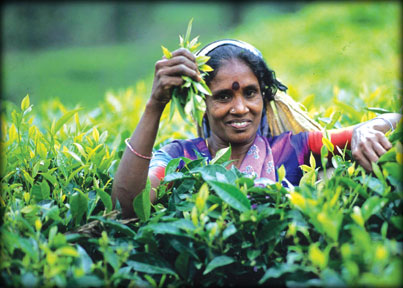The cup that cheers
 A cup of tea is one of the simplest but greatest pleasures of life.
The aroma, the taste, the colour - they all add up to a sensation like
no other. Tea can help you to perk up - or relax. It is a versatile
drink that you can drink on its own, or with a little milk and sugar. It
is certainly the 'cup that cheers'. A cup of tea is one of the simplest but greatest pleasures of life.
The aroma, the taste, the colour - they all add up to a sensation like
no other. Tea can help you to perk up - or relax. It is a versatile
drink that you can drink on its own, or with a little milk and sugar. It
is certainly the 'cup that cheers'.
Sri Lanka has earned a name for itself as a leading producer of
quality teas along with China, India and Kenya.
It is the third biggest producer of tea in the world, with a
production share of 9 per cent.
The trademark/brand name 'Ceylon Tea' is known the world over. It is
what tea connoisseurs the world over yearn for when they seek a good cup
of tea - nearly 20 per cent of tea available in the world market is from
Sri Lanka.
Tea, along with coconut and rubber, is a primary crop grown in the
hill country and certain parts of the South.
It is certainly a legacy of British rule, but one that has been
beneficial to the country in terms of export earnings. Sri Lanka has
produced 302,451,198 Kg of tea so far this year, most of which was
exported.
Tea is cultivated in over 187,000 hectares. We tend to think of large
scale producers and factories when tea is mentioned, but the truth is
that most of the tea is cultivated by tea smallholders.
It is vital to recognize the role played by tea smallholders in the
tea industry as they contribute nearly 75 percent of the national tea
production. Ensuring their welfare is vital for sustaining and improving
the tea industry.
 It is in this context that we welcome the rejuvenation of the Tea
Shakthi Fund under a new structural framework to provide social security
to tea smallholders and promote necessary investments related to the tea
industry, as reported in newspapers recently. It is in this context that we welcome the rejuvenation of the Tea
Shakthi Fund under a new structural framework to provide social security
to tea smallholders and promote necessary investments related to the tea
industry, as reported in newspapers recently.
Plantation Industries Minister Mahinda Samarasinghe has stressed the
need to be supportive of tea smallholders and provide the necessary
advisory and extension services through the Tea Shakthi Fund to them.
More tea smallholders must be encouraged to form collective
associations to market their output to factories in their respective
areas.
The revival of defunct tea factories is also essential to improve the
tea industry, which like every other sector, has suffered during the
global economic recession.
Tea must be marketed more around the world. A plan was mooted
sometime ago by several tea producing countries to form an OPEC-style
organisation to market tea. It is not clear whether it is functional,
but we need to introduce Ceylon Tea to more countries, without just
depending on our traditional tea buyers such as the Middle East and CIS
countries.
The Government has just announced a global tea promotion campaign
which we hope will achieve bigger sales for the beverage.
This program will market our teas under the Ceylon tea Lion logo,
which is universally known. The authorities' plan to apply for global
intellectual property protection for Ceylon Tea is also laudable.
Another initiative - to publicize Sri Lankan teas as teas grown without
using Ozone depleting substances - will strike a chord among many
consumers the world over.
Yes, we must compete with coffee, carbonated beverages and fruit
juices, but tea has many health advantages over these. The tea industry
must publicize these benefits worldwide and leading tea companies must
participate in more trade shows, which will help attract new buyers. Tea
promotions could also be held regularly in leading capitals of the
world.
It is also prudent to manufacture more varieties of tea.
Most of our tea exports are in the form of orthodox (black loose)
tea, with little or no value addition. The industry should look at
exporting more value added, instant teas.
The volumes of Cut Tear Curl (CTC) processed teas in tea bag form
should also go up. Our tea manufacturers already make some exciting and
innovative flavoured teas, but they should conduct more experiments to
introduce new flavours for new markets.
The manufacture and export of more varieties of iced tea should also
be encouraged by the authorities.
There is also a market for canned hot tea in some countries with an
extensive network of vending machines, such as Japan.
Green tea is becoming popular in many countries. If the local tea
industry can increase the green tea output (2,979,066 Kg this year) and
exports, it will be a big boost.
The health benefits of green tea are fairly well known and flavoured
green teas are also becoming popular worldwide.
This is another market that we can exploit although it will take time
for the local tea industry to match the output of the biggest green tea
producing countries.
 Sri Lanka produces some of the world's best tea, but most Sri Lankans
cannot really enjoy a good cup of tea. Most teas in the local market are
low quality blends incorporating a fair amount of dust and fannings. Sri Lanka produces some of the world's best tea, but most Sri Lankans
cannot really enjoy a good cup of tea. Most teas in the local market are
low quality blends incorporating a fair amount of dust and fannings.
Even the Broken Orange Pekoe Fannings available in the local market
are fairly expensive. This situation should change - local consumers
must be able to buy quality teas at affordable rates.
True, we must give priority to exports, but Sri Lankans too deserve a
good cup of tea. Top quality teas must not be outrageously expensive and
inaccessible in the local market.
Sri Lanka is also not actively promoting tea tourism, to coin a term.
The main tea museum at Hantane, Kandy, a joint project of the Sri Lanka
Tea Board and the Tea Planters Association of Sri Lanka, must be
popularized as a major tourist attraction. The same goes for the
privately owned tea museums. Working and non-working tea factories (with
their machinery intact) are also potential tourist attractions.
The concept of tea trails or hikes in tea plantations can also be
popularized among locals and tourists keen to get close to nature.
After all, tea is nature's own drink and an easy way to connect to
the many splendours of nature.
|

